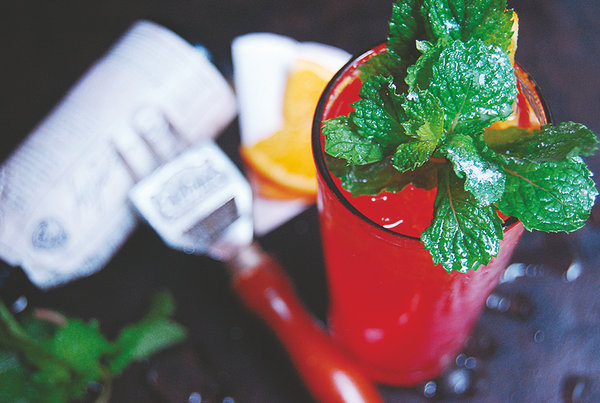China's tippling hub
By Alywin Chew in Shanghai ( China Daily ) Updated: 2016-07-02 09:35:16
 |
|
The drinks and food offerings at The Union Trading Company.[Photo provided to China Daily] |
Unlike Yao's cozy enclave or Gokan's secretive cocktail hideout, The Nest is a modern-chic, one-stop destination that serves cocktails and Nordic-inspired food created by award-winning bartenders and chefs. The place also ramps up the party atmosphere after 11pm with pulsating electronic music. The Nest is backed by Shanghai's MUSE Group and Vodka brand Grey Goose.
"I think the success of The Nest has to do with it having a good mix of everything. It's got a great party atmosphere and you can have a meal and enjoy good cocktails at affordable prices. There are hardly any places near the Bund that sell cocktails for 68 yuan ($10) a glass," says Carson Xie, head bartender of The Nest and the winner of the 2014 Bacardi Legacy Cocktail Competition.
Challenges to overcome
When asked about the current problems in Shanghai's cocktail industry, the first thing that comes to the minds of bar operators is staffing.
It may seem a rather strange phenomenon considering the size of China's labor force, but Xie is quick to highlight several factors that have contributed to this situation. One of them is the lack of a supply line of talent. While there are several bar-tending academies in the country, Xie says that many of them don't actually teach anything useful.
"Some of the schools are just out to cheat people of their money. Many of these so-called bartending teachers have never been behind a bar counter. The best way to learn about crafting cocktails is through on-the-job training," says the 34-year-old.
At the root of the problem, however, is the fact that most people don't regard bartending as a viable career option.
"First, it's the odd working hours. This type of lifestyle can be really tiring and disruptive to one's social life," says Xie.
"Also, bartenders in Shanghai don't get paid more than their peers in other industries. When you combine these two facts, there's really no motivation for people to want to join the industry."
For Yao, another problem lies in the lack of confidence in many locals. He said that because individualism has never been strongly encouraged in Chinese culture, people often shy away from taking up responsibility and letting their personalities shine.
To address this issue, Yao puts his staff through intensive training sessions which comprise bartending skills as well as confidence-building activities. He also makes it a point to rotate his bartenders between mixing drinks and service, ensuring that everyone is comfortable with customer interaction.
To foster individualistic creativity, Yao challenges his staff every few months, usually before the change in season, to come up with new concoctions. The most outstanding creations are then included in the new seasonal menus, alongside the bartender's name.
Yao's training methodology has seemingly worked wonders for talent retention. Only one of his bartenders has quit since Union's inception. One of them, Lucky Huang, has even gone on to emerge among the top three contestants in the Bacardi Legacy Shanghai competition this year.
Another major issue that Yao highlights lies in the cultural stigma that age equates capability. For instance, he has received snubs from potential business partners because they deemed him too young - Yao turns 29 this year.
"Many people think that you have not earned your stripes in society if you're young, and hence cannot be taken seriously," he says.
"I've even heard remarks suggesting that if you're successful at a young age, you're either a one-hit wonder or you're backed by rich parents. Look, my dad is a journalist by day and a painter by night. He's no millionaire."
alywin@chinadaily.com.cn
|
|
|
|
|
|
|
|

























 Raymond Zhou:
Raymond Zhou: Pauline D Loh:
Pauline D Loh: Hot Pot
Hot Pot Eco China
Eco China China Dream
China Dream China Face
China Face






